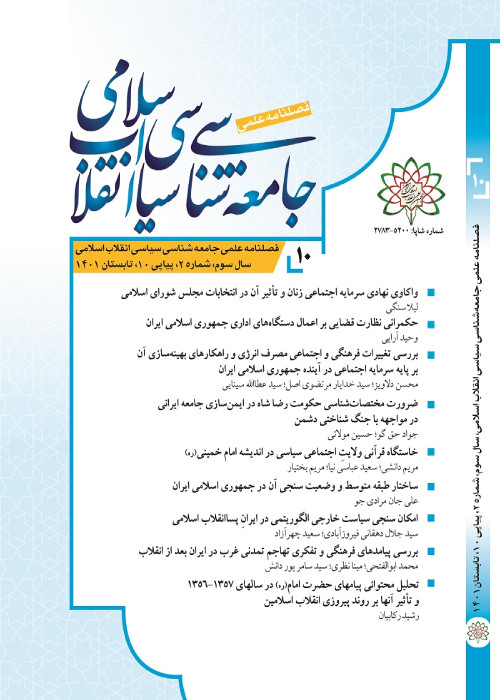Evaluation of cultural independence in the Sixth Development Plan of the Islamic Republic of Iran
Culture is the basis for the formation, consistency and preservation of a society and its demarcation with different societies; Hence, most societies are concerned about the preservation and independence of their culture from other cultures, especially invasive cultures, and it is an issue for them. The occurrence of the Islamic Revolution with a cultural nature was the inauguration of cultural independence along with other dimensions of independence that put the revolutionary society of Iran on a transcendent path with an Islamic-revolutionary culture and the holy defense strengthened and consolidated this situation. After the end of the war, with the aim of economic reconstruction and compensating for the backwardness of the Pahlavi era, the development and implementation of development plans was on the agenda of the government of the Islamic Republic. Development programs, considering its macro approach, affect various areas of society, including the field of culture. Given this experience in the Islamic Republic, and in particular, the experience of the Sixth Development Plan, the question arises that what effect did the formulation and implementation of the Sixth Development Plan have on the cultural independence of society after the Islamic Revolution? In response to this issue, with a descriptive-analytical approach, we tried to evaluate cultural independence and its indicators in the minds of the Imams of the Revolution, especially the communicative policies of the Supreme Leader and its comparison with the Sixth Plan formulated and implemented in the eleventh and twelfth governments. Let's deal with culture in the sixth program. In this regard, by reviewing and explaining the Sixth Plan and the policies of the Eleventh and Twelfth Governments in the form of the Sixth Plan bill and its actions during the implementation of the program, by looking at the intellectual foundations of government designers and development consultants in this period, to evaluate cultural independence and its indicators. We dealt with the statements of the Imams of the Revolution, and in particular the general policies of the system, in this atmosphere and conditions prevailing in the Sixth Plan. Based on this assessment, it is hypothesized that post-war development plans, and in particular the Sixth Plan, have advanced the evolution of cultural nutrition sources and provided grounds for cultural dependence.
- حق عضویت دریافتی صرف حمایت از نشریات عضو و نگهداری، تکمیل و توسعه مگیران میشود.
- پرداخت حق اشتراک و دانلود مقالات اجازه بازنشر آن در سایر رسانههای چاپی و دیجیتال را به کاربر نمیدهد.


